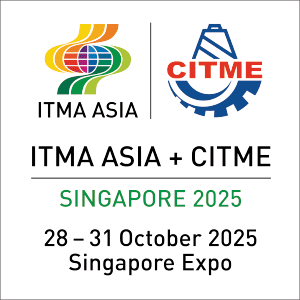
Tirupur Exporters Association – popularly known as TEA – was established in the year 1990. This is an Association exclusively for exporters of cotton knitwear who have production facilities in Tirupur. From the modest beginning TEA has grown into a strong body of knitwear exporters. Today, it has a membership of 951 Life members and 155 Associate Members. Last year, Raja M Shanmugam was elected as the President of Tirupur Exporters’ Association (TEA) after Padma Shri Dr. A Shaktivel stepped down as TEA President to leave way for youngsters. The change of guard was seen in the industry as the result of a group of younger and progressive entrepreneurs, who floated “Team for Change”.
Besides, Shanmugam is the Chief Mentor of NIFT-TEA institution and Founder President of CII- Tirupur chapter. He is engaged in the business of garment exports and the Managing Partner of Warsaw International, Tirupur and Director in Alpine Group of Companies. Besides, his public offices include membership in Cotton Advisory Board, NBMSME, and as President of Forex Derivative Consumers’ Forum, Tirupur. To know more about Tirupur knitwear cluster and TEA’s plans for its development, B. P. Mishra, Associate Editor Knitting Views’ recently met and interviewed Shanmugam. Given are some excerpts…
What is the current scenario of Tirupur knitwear industry?
The cotton yarn price increase by Rs. 20 per kg in last month has literally pushed the knitwear garment export sector into a difficult situation and to sustain in the competitive global environment. The knitwear export sector has been passing through a challenging business environment further to implementation of GST and this could be apparently witnessed from the continuous declining of knitwear exports month on month basis since October 2017, after three months transition period is over and the declining of exports for the second half yearly period of 2017-18 was 21 per cent. The most worrying factor is that the negative trend in exports growth is continuing in the current financial year also and the average decline of knitwear exports in the month of April and May was 34 per cent.
The knitwear sector is now only booking the orders, business have now started to look ahead and poised to bring back the industry from brink after prolonged one year period lull and at this point of time, the increase in yarn prices would derail the industry and the aftermath effect would be severe as not only the knitwear garment sector will get affected but also there will be a boomerang effect on the textile mills. Considering this crucial concern and the overall benefit of textile industry, we appeal the textile mills not to increase the cotton yarn prices and also not to stop cotton yarn supply.
What has been the impact of major govt. decisions in last one year?
Commoners have been double victimized by the demonetization policy. Manipulators have managed to gain victory; it’s the common people who have to suffer and government should have taken care of the commoners. The government should have encouraged the mass to avert getting indulged in unethical practices. Wrong doers are more in numbers, as they have gained the confidence as no strict actions have been taken against them.
Bank employees had managed to settle their black money as well but these loopholes could have been curbed if the govt. had taken necessary measures before demonitisation, than definitely would have become a huge success. Intention was good, but outcome became where the govt. couldn’t take it beyond certain limit. This was followed by GST, which changed the macro economy but we need to take care of the micro demands as micro organizations had to suffer. Trial could have been made for GST and then whatever changes were needed could have been included and then could have been introduced as a mandatory policy.
All the policies should have been pre planned after considering all the pros and cons and then only should have been brought into implementation. The overnight decision of GST implementation choked the whole system. The hasty implementation had become self – defaming for the govt. The whole system has changed and many changes had to be made in the system.
As an exporter how has the GST affected the business? Why is the business going down?
GST has affected us in numerous ways. Next to agricultural sector is this sector and the government should do the needful for the welfare of the same. The difficulties emerged because neighboring countries like Bangladesh, Vietnam, Cambodia, Pakistan, Sri Lanka, Myanmar all these have advantage portion as they fall under under-developed nation categories either or they’ve got their own bilateral agreement with the European Union on FTA front. Thereby they are placed on advantageous position than India. So, India has to compete. The advantage for India is the raw material producing country in comparison to all these neighbouring countries. India again has advantage of having huge workforce because we are going to be the youngest nation among community of nations. But despite of that we get defeated by the small emerging countries on textiles and readymade garment front. Reason being that they do have easy access to the consuming markets in Europe and America. So, already we have disadvantage of 10-14 per cent when it comes to exports. Besides, they are also other policy related factors with India which is an additional advantage for other countries.
Moreover, raw material from India is sucked out by the competitor countries, where again India is losing. Govt. should adopt a proper and stronger promotion policy now. They should increase Duty Drawback Rate, ROSL rate, Interest Equalization Scheme rate to bail out the knitwear exporting units out of the crisis. We also need to have FTA, CEPA, CECA expediently to have a level playing field in the global market further to increasing of Chinese investment in our neighbouring countries. We have good leaders but system needs to be worked on, which is not changing since age-old. Serious ground level dialogues have to be done by the officials. Besides, GST refund is also not getting properly given to us, which should be made faster as the dues are pending for more than a year.
Earlier banking systems were working in a very professional and healthy manner, reason being the field officer would have direct relation in analyzing the loans and bounds of the loany. That has been worked out and appreciated. The growth has been taken forward so it has benefitted loany as well as loaner equally. After the advent of BASEL norms, it has changed as they are not connected to each other in direct manner. Hence, we are seeking for a revisit to the NPA policy by banks through government channels since such changes needed intervention of various monetary policymakers. Currently, the pendency of dues under Remission of State Levies scheme alone stand at Rs. 450 cr collectively for the Tirupur knitwear cluster. Besides, there was an outstanding capital goods subsidy of Rs. 100-odd cr for the entrepreneurs here under the Amended Technology Upgradation Fund Scheme.
The banks should take up loan dues and the subsequent classification as NPA on a case-to-case basis instead of following the blanket norms on NPA classification. They should take into consideration how much dues are pending for a particular industrialist and proportionally compute the loan portion which should be turned NPA.
What is your take on recent increase in custom duty by the govt.?
The Department of Revenue, Ministry of Finance has increased the Basic Customs Duty from 10 per cent to 20 per cent for import of 23 knitted garments items and also one knitted fabric item, which came into effect from 16th July 2018. The textile products imports from countries like China, Bangladesh, Vietnam, Cambodia and Sri Lanka have been significantly increased with CAGR of 17 per cent in Five years and in last year itself, the RMG imports has increased from Rs. 3,994 cr in 2016-17 to Rs. 4,983 cr in 2017-18. The leading retail stores in our country have also started importing garments from Bangladesh and other countries, as it is cheaper compared to garments produced from our country.
Considering the vulnerability of Indian textile industry and a serious threat to employment, Tirupur Exporters Association has been continuously making representations to the government and also emphasizing the threat during the personal discussion with the Hon’ble Ministers and Secretaries and appealing to restrict the textile products imports. We have also submitted a white paper to the Hon’ble Union Minister of Textiles detailing the issue and how threat has emerged from China by setting up their factories in our border countries to take advantages of abundant availability of labour, low wages and also customs duty exemption available to these countries in the EU, Canada etc. Under agreement on South Asian Free Trade Area (SAFTA), some specified garment items imported into India from Bangladesh is also exempted. We thank Union Minister of Textiles for considering the requisition, taking a swift action and helped for increasing the Basic Customs Duty from 10 per cent to 20 per cent to protect our textile industry and also employment. The Minister is taking a lead role for the protection of industry and also growth of industry.
Please tell us about the recently opened NIFT-TEA incubation center?
AIC-NIFT-TEA Incubation centre is non-Profit organisation registered as section eight company under the companies’ act 2013. The main motive behind it is to continuously support existing & aspiring entrepreneurs in transforming knowledge and innovation into sustainable enterprises that will enable them to compete in and contribute to a global society. It has world class facility with suitable infrastructure in terms of state-of-theart machinery, lab facilities national and global mentors, business and planning support, access to seed capitals, industry partners, training, consultancy and other relevant components required encouraging the startup in textiles and apparels.
The centre was meant for the purpose of innovation and entrepreneurship promotion in India through various initiatives and NITI Aayog would provide a grant-in-aid of up to Rs. 10 cr for a period of five years to the Atal Incubation Centers (AIC). It has 10,000 sq.ft building having the incubation facilities comprising product development, training, conferencing and incubatee work space, in which budding entrepreneurs who want to create to startups in the areas of textiles and apparels could be enrolled as incubatee and nurture their innovative ideas.
The AIC-NIFT-TEA Incubation Centre for Textiles and Apparels itself is epitome of demonstrating Unity in Diversity. Around 200 industrialists have joined hands to promote this industry. It’s difficult to unify all the competitors to come together. The govt. has blessed to get the Incubation Centre of its own for this industry which is an achievement for Tirupur.
What is your message to your member exporters?
In our Association Executive Committee meeting recently we discussed on the increase in cotton yarn prices, job working charges, accessories prices including other related expenses and felt that working with the existing garment prices would certainly lead to a difficult situation and cant not be sustained in longer term. Considering the current scenario, the Executive Committee unanimously decided to ask our members to send a communication to their buyers to increase the garment prices by 10 per cent while finalizing the new orders to compensate the increase in input prices. The units are taking a lot of measures and implementing latest techniques and technologies to increase their efficiency and enhance competitiveness in world market.






















